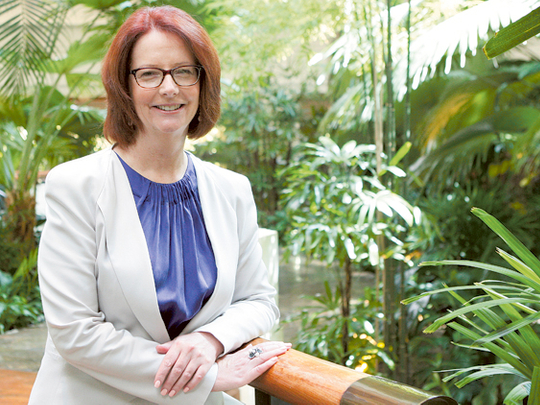
Dubai: There are 250 million children who attend school but are still unable to read and write, warned the former prime minister of Australia, Julia Gillard, during a visit to Dubai to focus on partnerships with UAE governments and organisations.
Gillard, who is the Chair of the Board of Directors of the Global Partnership for Education (GPE), stressed the importance of providing and measuring quality education, which she said was a goal shared with the UAE’s Dubai Cares.
GPE, which is a multilateral partnership devoted to providing the 57 million children not enrolled in school with a quality education, signed a Memorandum of Understanding with Dubai Cares in September.
“Dubai Cares is assisting in funding a project in Vietnam where they are rolling out an education model that provides very clear materials for teachers to fill education gaps in the less accessible parts of the world where you would not necessarily have a highly trained teacher,” Gillard said.
Gillard said the model, which was developed in Colombia, aims to spread education and is currently being evaluated to see how effective it has been.
A learning taskforce is another objective shared between GPE and Dubai Cares. Gillard said it focuses on measuring how well students are learning to find out the areas that need to be improved.
“Dubai Cares has taken a particular interest in this,” Gillard said. “If we find ways of generating good learning measures it means that we will not only be saying there are 57 million children out of school, will also know if the quality of their learning is improving, what is working and what needs changing.”
Gillard said the MOU with Dubai Cares is a strong building block to strengthen partnerships between the UAE and GPE.
“We certainly want to make sure that there is a strong Arab voice around the table as GPE goes about its decision making,” she said.
GPE’s second replenishment targets (2015 to 2018) aims to raise $3.5 billion (Dh12.9 billion) from donor funds, which will go towards working with developing countries to provide education access to 29 million children from 2015 to 2018.
“We are concerned about funding,” Gillard said. “We are concerned that of the money that goes into aid and development work around the world, education hasn’t been holding its place and getting its share, although education is what truly transforms the future of individual lives.”
GPE also aims to lift the quality of education as an estimate 250 million children are still unable to read and write by the time they reach fourth grade
Among GPE’s objectives is providing access to quality education with a particular focus on girls’ education, which Gillard feels strongly about.
“You would expect me of all people, having been a woman leading a nation in a world where it is still not very common, to say that girl education is vital,” she said. “But is not just an emotional response from me. There is very hard evidence that shows that educating girls is one of the biggest single things that we can do to combat poverty.”
Commenting on the Syrian conflict, Gillard said broadening GPE’s work to be able to respond to humanitarian crisis situations is among its long-term plans. “We are very admiring of the work that is being done here in the UAE for children who are of such great need in support for the continuation for education,” she said.











